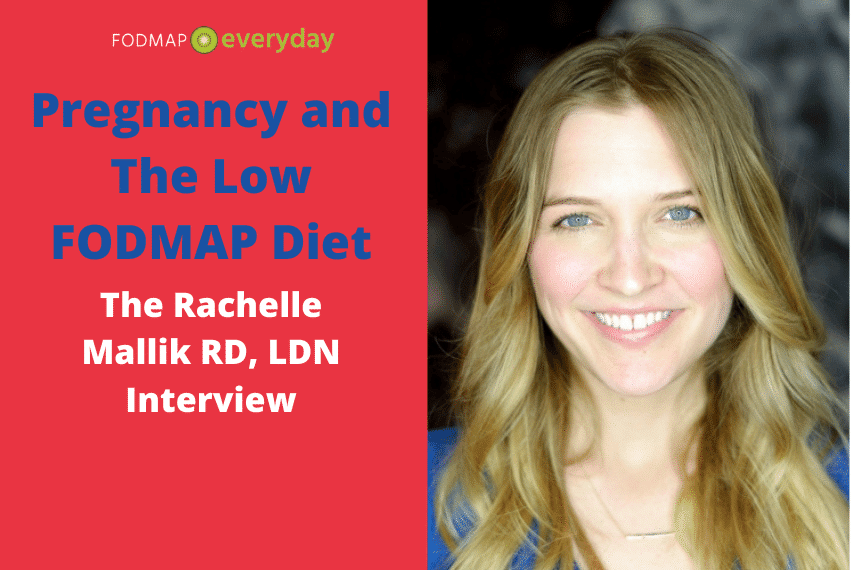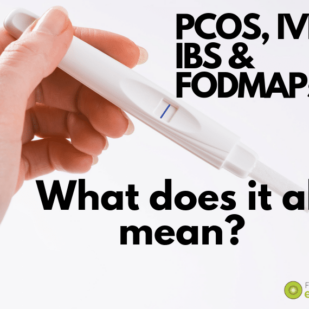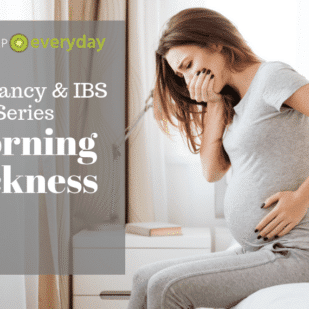Rachelle Mallik is Our Success Team Member Focusing on Women’s Health
In our on-going Interview series we have brought you the RDNs of our Success Team and this article highlights Rachelle Mallik MA, RD, LDN, founder of The Food Therapist, LLC.
Rachelle lives in the Chicago area and works with clients in person and virtually. Her areas of interest include women’s health, especially for fertility, prenatal and postnatal wellness. And being a Mom herself, she speaks from experience. We sat down with her to discuss how her interest expanded to the low FODMAP diet and her experiences counseling women in general and on the diet.
Rachelle, thank you for doing this interview! We want everyone to get to know our RDNs and we figured this was a great way. When we first found you we were intrigued by your stint in Melbourne, Australia. Is this when you first became aware of the low FODMAP diet?
Yes, the first time I recall hearing the term low-FODMAP diet was in 2013 while I was living in Melbourne, Australia. Monash University is in Melbourne, so it made sense there was more awareness of their research into IBS and FODMAPs. Low FODMAP packaged foods also started appearing on grocery shelves during my time in Australia.
Did you immediately think about how this new diet could help women both prenatally and postnatally who were also dealing with IBS? Had you been counseling women at these stages before and felt the need for more tools that could help them?
It definitely sparked my interest in learning more about the diet and how it could potentially help women before, during and after pregnancy. While I’ve learned the low-FODMAP Elimination diet should not used during pregnancy, knowing which foods are high in FODMAPs allows me to help pregnant women address their IBS and digestive issues safely. Whether you are preconception, pregnant, or postnatal, it’s important to work with a dietitian who can help you navigate the low-FODMAP diet as well as the changing nutrient needs that accompany these stages.
How did you come to be an RD in the first place? Was there something in particular that attracted you?
I earned my Bachelor’s degree in Human Nutrition, and I was also pre-med with the intention of going on to medical school. To gain more experience in the medical field after university, I became a patient coordinator at the Weill Cornell Center for Reproductive Medicine and Infertility. During my experience working with women and couples struggling with infertility, I realized the importance of diet and lifestyle modifications to address fertility issues both preventative and therapeutically. I decided to complete my dietetic studies to become a Registered Dietitian.
I continued working full-time at the fertility center and started taking evening classes at New York University, where I completed my dietetic coursework and earned a Master’s degree in Food Studies. Through this unique field of study examining food culture, policy and systems, I have been able to apply nutrition science in the context of our modern society.
“Nutrition is not just about what we consume, but how we consume.”
Was food a big part of your childhood?
Absolutely. My family will tell you I’ve always had a good appetite and enjoyed eating. I was fortunate to grow up on the East End of Long Island (the Hamptons), which has incredible local seafood and produce. I didn’t know what a farmers’ market was until I was living in New York City because we bought fruit and vegetables at the actual farms! As I mentioned before, I ended up pursuing my Masters in Food Studies to balance my clinical, scientific background with a deeper understanding of how aspects like culture, policy and systems affect food choices and nutrition.
Statistically does pregnancy exacerbate IBS? Is it the hormones or do we know why? Does it often first appear during pregnancy?
I am unaware of any statistics on that, but changing hormones during pregnancy can worsen or alleviate IBS symptoms. Symptoms of diarrhea-predominant IBS may improve during pregnancy, whereas symptoms of constipation-predominant IBS may worsen. This is due in part to the hormone progesterone, which slows down the GI tract. Even for women without IBS, it is common to experience other gastrointestinal discomforts when pregnant, including nausea, vomiting, heartburn and constipation. These can be attributed to hormonal changes, but a dietitian can help women address these discomforts through dietary and lifestyle changes.
What are the particular challenges for women during pregnancy who want to try the low FODMAP diet? Are there pregnancy stages that are better to embark upon the diet and stages that are less conducive?
It is not recommended to start a low-FODMAP Elimination diet during pregnancy because of increased nutrient and calorie needs and lack of research. If you were following a modified-FODMAP diet prior to pregnancy, you should work with a dietitian to assist with food re-introductions and ensure nutritional adequacy of your diet.
What are the areas of nutritional need during pregnancy that might not be addressed well through the diet? How about while breastfeeding?
Fiber is super important during pregnancy to help reduce constipation. Foods high in FODMAPs are often good sources of fiber, so if there are certain FODMAPs you’re avoiding, make sure you choose high-fiber low-FODMAP options and drink plenty of water. As for breastfeeding, more than the nutrients, I think lack of time and sleep can be one of the greatest challenges. When you’re too tired or busy to make a proper meal, you might reach for convenience foods or order take-out, which makes it harder (though not impossible!) to limit FODMAPs.
In closing, do you have some supportive parting words for any women reading this who are pregnant and dealing with IBS symptoms?
Remember that what you’re experiencing now is likely temporary. I had what felt like intractable burping; it was constant. I avoided some foods that seemed to make it worse, but nothing made it go away. As soon as my baby was born, the burping went away too. If you’re considering making any significant dietary changes, talk to a Registered Dietitian who can safely help you address your dietary issues. Finally, try to look at pregnancy as an empowering time. You’re creating a human! I know there are times when that tiny human seems to be causing all of your problems (the morning sickness, having to pee all the time, back pain, etc.), but you are a rock star for doing everything else in your life while also nourishing life within.
Rachelle, thank you so much for this interview. Your work is so important; we want all new and prospective Moms to thrive as well as they can and enjoy their time with their newborns and young children.
Check out Rachelle’s other articles, Pregnancy & IBS Series: Morning Sickness, Pregnancy & IBS Series: PCOS, IVF, IBS & FODMAPs, Pregnancy, GI Discomforts & FODMAPs and one on how to navigate a farmers market.








